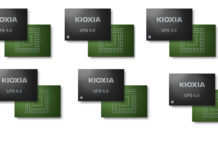GPU-powered RAID card supplier Graid has a coming software release designed to accelerate sequential writes to 90GBps or more in RAID-5 configurations.
It ascribes this 4-9x speed boost for its SupremeRAID product to intelligent parity data reduction technology. Graid claims this will enable users in AI/ML, video processing, and similar workloads to write data to NVMe drives at record speeds.

CEO Leander Yu said in a statement: “This new enhancement offered by Graid Technology will give users of SupremeRAID a clear competitive advantage in the marketplace. The ability to write unstructured data sets to high speed NVMe drives at such an accelerated rate will save our customers tremendous amounts of time and drive a lower TCO on their infrastructure purchases.”
RAID-5 aggregates a set of drives into a single logical unit and stripes blocks of data across them as well as using distributed parity to protect against a single drive failure. The group size is determined by the number of drives needed to provide a desired capacity level plus one spare drive. A feature of RAID-5 is that reads are fast while writes are slower due to parity calculations. Graid appears to think it has cracked that nut.
Currently there are two SupremeRAID products. The SR-1000 uses PCIe gen 3, delivers 16 million IOPS, and 110GBps sequential read but only 11GBps sequential write throughput, with up to 32 SSDs. A 4-9x write speed boost would take that 11GBps number past 90GBps. The SR-1010 uses PCIe 4 and goes faster on the IOPS front, putting out 19 million IOPS, but has the same 110GBps sequential read throughput.
The new software release will be available for the SR-1000 and SR-1010 products in the summer. As well as improving performance by removing IO bottlenecks, it is designed to lower host CPU utilization too, the company claims. It will be available to all Graid Technology customers, regardless of channel, as a free upgrade upon general release.
Bootnote
The >90GBps sequential write number was based on a host running Linux RAID-5 with Intel Xeon Gold 6338 CPU, 32 cores at 2.0 GHz x 2, and with 20 Phison EPW5970 NVMe drives.







